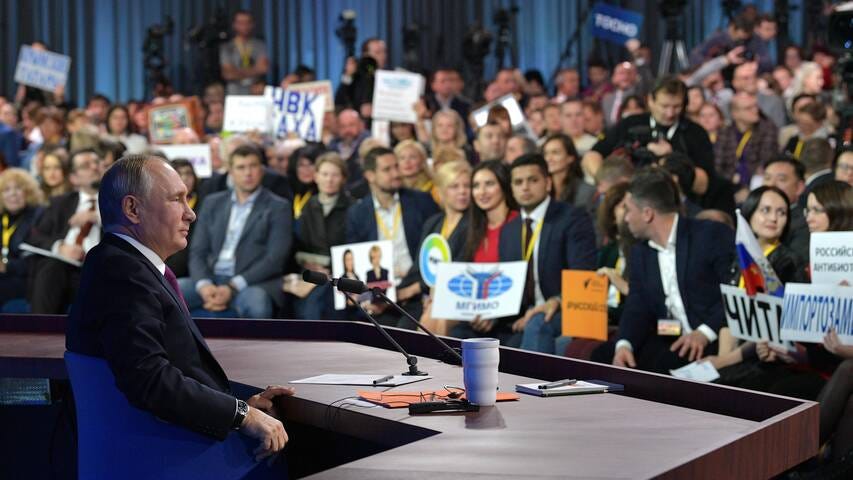Does Vladimir Putin have any regrets?
In his traditional end-of-year television show, Vladimir Putin appeared more determined than ever to continue the war, despite his compatriots seemingly preoccupied with far more pressing concerns.

For the second time since the start of the war in Ukraine, Vladimir Putin engaged on Wednesday, December 18, in an exercise he appears to relish: the annual "Direct Line" with his fellow Russians. In high spirits, he stretched the pleasure of these exchanges—his televised marathon lasted four and a half hours—frequently stepping into the moderator role usually held by his loyal spokesperson, Dmitry Peskov, to assert control over the proceedings. “Don’t pay attention to him; I’m the boss here,” he quipped, earning the audience’s approval and a stoic smile from Peskov, who has likely endured much worse.
Traditionally held before the year-end holidays, this “Direct Line” is a meticulously staged television spectacle during which the head of state responds to questions posed by Russians from every corner of the country, as well as by journalists present in the room. Last year, the discussion largely revolved around the presidential election (which the “boss” won decisively a few weeks later). This year, after nearly three years of large-scale war, one might have expected the question of peace prospects to figure more prominently among Russians’ concerns. That wasn’t the case—at least not in the curated questions selected by the organizers, who revealed that, for the first time, they had used an AI system to identify key trends among the roughly 2.5 million questions submitted to the president. The results indicated that Russians are primarily worried about housing, healthcare, road conditions, pensions, and, incidentally, the rising cost of airfare.
A tribute to the "boys" at the front
The war—still officially referred to as the "special military operation"—surfaced only tangentially, in concerns about military pay or the situation in the Kursk region, targeted by Ukrainian incursions since last summer. One woman asked when she might return to her home there. Putin assured her that fierce battles were ongoing to drive out Ukrainian forces but admitted he couldn’t provide a specific date. “If I were to give a deadline, I know our boys on the ground—they’d push to meet it regardless of the cost. I can’t allow that,” he explained.
However, there was unanimous agreement on the need to pay tribute to these “boys” sent to the front, where the Russian army, Putin reiterated, continues its relentless advance. The president even displayed the flag of a special unit deployed in Kursk—the 155th Guards Marine Brigade of Motorized Riflemen—to the applause of the audience. Whether by coincidence or deliberate gesture, this brigade happens to be the one Kyiv prosecutors accuse of atrocities in Bucha and even the decapitation of a captured Ukrainian soldier. Yet, no one present dared broach these allegations.
Two Western journalists, one American and one British, were nonetheless allowed to ask questions—“so they can justify their salaries,” Putin joked. They seized the opportunity to question the successes of the Russian army and bring up the assassination of a Russian general in Moscow just two days prior. Was Russia not in a weakened position to negotiate with the new American president? “Don’t mistake your wishes for reality,” Putin retorted sharply, asserting that Russia has never been stronger, more resolute, or more sovereign in its decisions.
"Do you have any regrets?"
Buoyed by this exchange, Andrei Kolesnikov, a special correspondent for Kommersant and arguably the sharpest journalist in Putin’s presidential press corps, dared to pose a question about the “war” (using the banned term instead of “special military operation”) as the show entered its fourth hour. “After three years of war, we’ve all changed profoundly,” he sighed. “And you?” To this, the Kremlin leader replied with solemnity that he now “joked less and hardly laughed anymore.” This somber claim seemed at odds with his jovial mood that day, as he made numerous quips and even shared a risqué anecdote from the Soviet era.
“If you could go back to February 24, 2022, would you do the same? Do you have any regrets?” asked a Russian journalist, referring to his decision to invade Ukraine. “Yes, I should have done it earlier—and prepared for it sooner,” Putin replied without hesitation. This rendered almost moot the few questions from the audience about potential negotiations with Kyiv. “Our conditions are well-known; let’s not waste time repeating them,” he said, almost bored. However, he did note that Russia’s demands—Ukraine’s neutral status, recognition of Russian territorial gains, and the country’s “demilitarization”—had grown to include an additional requirement: any ceasefire must be signed by “legitimately elected” Ukrainian representatives, referencing the expiration last May of Volodymyr Zelensky’s presidential mandate. Paradoxically, “legitimacy” appears to be something the Putin-era Russia holds in high regard.



